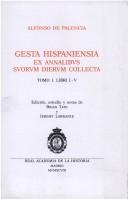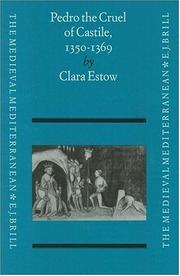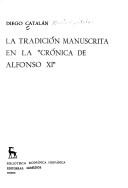| Listing 1 - 10 of 13 | << page >> |
Sort by
|
Book
ISBN: 8486047935 9788486047931 Year: 1987 Publisher: Valladolid Mbito
Abstract | Keywords | Export | Availability | Bookmark
 Loading...
Loading...Choose an application
- Reference Manager
- EndNote
- RefWorks (Direct export to RefWorks)
Castile (Spain) --- Navarre (Kingdom) --- Spain --- History --- Castile (Spain) - History --- Navarre (Kingdom) - History --- Spain - History - 711-1516
Digital
Year: 1796 Publisher: Madrid En la impr. de B. Cano
Abstract | Keywords | Export | Availability | Bookmark
 Loading...
Loading...Choose an application
- Reference Manager
- EndNote
- RefWorks (Direct export to RefWorks)

ISBN: 8489512051 8489512434 9788489512054 Year: 1998 Publisher: Madrid : Real Academia de la Historia,
Abstract | Keywords | Export | Availability | Bookmark
 Loading...
Loading...Choose an application
- Reference Manager
- EndNote
- RefWorks (Direct export to RefWorks)
Henry --- Castile (Spain) --- Castille (Espagne) --- History --- Sources --- Histoire --- Henry - IV, - King of Castile and Leon, - 1425-1474. --- Castile (Spain) - History - Henry IV, 1454-1474.

ISBN: 9789004100947 9004100946 9789004478091 9004478094 Year: 1995 Volume: 6 Publisher: Leiden; Boston : BRILL
Abstract | Keywords | Export | Availability | Bookmark
 Loading...
Loading...Choose an application
- Reference Manager
- EndNote
- RefWorks (Direct export to RefWorks)
This work deals with the reign of Pedro I of Castile (1350-1369), known as "The Cruel," one of the most notorious and misunderstood figures in the annals of peninsular history. This is the first book on the subject that analyzes Pedro's rule in light of social, political, diplomatic, and economic conditions in mid-14th century Castile. Using extant primary documentation from archival sources and the most recent findings of scholars from various fields, the book explores in detail the historical basis for Pedro's reputation and the extent to which this reputation unfairly rests on the testimony of Pero López de Ayala, the reign's principal chronicler. The book provides fresh insights into various aspects of Pedro's career, such as his political aims, relations with religious minorities, and fiscal policies.
Castille (Espagne) --- Kings and rulers. --- Pedro --- Pierre --- 1350-1369. --- Castile (Spain) --- Spain --- History --- Kings and rulers --- Biography --- Pedro I --- Peter I, 1350-1369 --- Pedro - I, - King of Castile and Leon, - 1334-1369. --- Castile (Spain) - History - Peter I, 1350-1369. --- Castile (Spain) - Kings and rulers - Biography. --- Czars (Kings and rulers) --- Kings and rulers, Primitive --- Monarchs --- Royalty --- Rulers --- Sovereigns --- Tsars --- Tzars --- Heads of state --- Queens --- Pedro - I, - King of Castile and Leon, - 1334-1369 --- Castile (Spain) - History - Peter I, 1350-1369 --- Castile (Spain) - Kings and rulers - Biography
Book
ISBN: 9788496849525 849684952X Year: 2009 Publisher: Madrid Real academia de la historia
Abstract | Keywords | Export | Availability | Bookmark
 Loading...
Loading...Choose an application
- Reference Manager
- EndNote
- RefWorks (Direct export to RefWorks)
Finance, Public --- Finances publiques --- History --- Histoire --- Castile (Spain) --- Castille (Espagne) --- Economic conditions --- History. --- Politics and government --- Conditions économiques --- Politique et gouvernement --- Conditions économiques --- Cameralistics --- Public finance --- Currency question --- Castile --- Castilla (Spain) --- Economic conditions. --- Politics and government. --- Public finances --- Finance, Public - Spain - Castile - History - To 1500 --- Castile (Spain) - Economic conditions --- Castile (Spain) - History --- Castile (Spain) - Politics and government

ISBN: 8424905857 8424905865 9788424905866 9788424905859 Year: 1974 Volume: 211 Publisher: Madrid Gredos
Abstract | Keywords | Export | Availability | Bookmark
 Loading...
Loading...Choose an application
- Reference Manager
- EndNote
- RefWorks (Direct export to RefWorks)
Núñez de Villaizán, Juan, --- Castile (Spain) --- History --- Historiography --- Nunez de Villaizan, Juan --- -Castile --- Castilla (Spain) --- -Nunez de Villaizan, Juan --- -History --- -Núñez de Villaizán, Juan, --- -Núñez de Villaizán, Juan, - active 14th century - Crónica de D Alfonso el Onceno --- Castile (Spain) - History - Alfonso XI, 1312-1350 - Historiography --- -History -
Book
ISBN: 9789004171367 9004171363 Year: 2009 Volume: 137 Publisher: Leiden Boston Brill
Abstract | Keywords | Export | Availability | Bookmark
 Loading...
Loading...Choose an application
- Reference Manager
- EndNote
- RefWorks (Direct export to RefWorks)
Charles --- Castile (Spain) --- Spain --- History --- Karel --- Carlos --- Karol --- Carlo --- Karl --- Karolus --- Carolus --- Charles-Quint --- 946.04 --- 946.04 Geschiedenis van Spanje: Karel V (I) en Philips II--(1516-1598) --- Geschiedenis van Spanje: Karel V (I) en Philips II--(1516-1598) --- Keizer Karel --- Charles - V, - Holy Roman Emperor, - 1500-1558. --- Castile (Spain) - History - Uprising, 1520-1521 --- Spain - History - Charles I, 1516-1556.
Book
ISBN: 1282400347 9786612400346 9047424670 9789047424673 9789004171367 9004171363 9781282400344 661240034X Year: 2009 Publisher: Leiden Boston Brill
Abstract | Keywords | Export | Availability | Bookmark
 Loading...
Loading...Choose an application
- Reference Manager
- EndNote
- RefWorks (Direct export to RefWorks)
Starting in the nineteenth century the scholarly consensus has been to attribute the decline of the Spanish empire to structural rigidity, corrupt bureaucracy and repressive policies. In The Empire of the Cities , Aurelio Espinosa challenges these theories and offers groundbreaking insight into Spain’s political process and emphasizes early modern state formation. Spain’s empire should no longer be viewed simply as a symbol of royal absolutism and dominance. Rather it functioned as a collection of autonomous municipalities interconnected by a parliament that articulated domestic programs and foreign policy. Professor Espinosa also provides a more nuanced understanding of the monarchical government in revealing new insight into royal institutions and management procedures under Emperor Charles V. The Empire of the Cities offers a fascinating and penetrating look inside Spain’s political system that encouraged both expansionism and domestic stability.
Comuneros-Aufstand --- Karl (Römisch-Deutsches Reich, Kaiser, V.) --- Charles --- Karel --- Carolus --- Charles-Quint --- Karl --- Keizer Karel --- Carlos --- Castile (Spain) --- Spain --- History --- Charles - V, - Holy Roman Emperor, - 1500-1558. --- Castile (Spain) - History - Uprising, 1520-1521 --- Spain - History - Charles I, 1516-1556.
Book
ISBN: 9782503532622 2503532624 Year: 2010 Volume: 5 73 Publisher: Turnhout Brepols
Abstract | Keywords | Export | Availability | Bookmark
 Loading...
Loading...Choose an application
- Reference Manager
- EndNote
- RefWorks (Direct export to RefWorks)
Isidore, --- Spain --- Castile (Spain) --- Espagne --- Castille (Espagne) --- History --- Sources. --- Histoire --- Sources --- 27 <460> "04/14" --- Kerkgeschiedenis--Spanje--Middeleeuwen --- Koningen (vorsten) --- Koningen (vorsten). --- Isidoro, --- Isidor, --- Isidorus, --- Seville, Isidore of, --- Sevilla, Isidoro de --- De Sevilla, Isidoro, --- Sevilla, Isidor von, --- Von Sevilla, Isidor, --- Izydor, --- Castile --- Castilla (Spain) --- Isidore of Seville --- 711-1516 --- Isidorus Hispalensis --- Isidore --- Isidorus ep. Hispalensis --- Isidore, - of Seville, Saint, - d. 636 --- Spain - History - 711-1516 - Sources --- Castile (Spain) - History - Sources
Book
ISBN: 9788496820876 8496820874 8415636423 849096288X 8415636423 Year: 2013 Volume: 6 Publisher: Madrid Casa de Velázquez
Abstract | Keywords | Export | Availability | Bookmark
 Loading...
Loading...Choose an application
- Reference Manager
- EndNote
- RefWorks (Direct export to RefWorks)
La rédaction de l’Histoire est une prise de position autant qu’une satisfaction personnelle pour les écrivains des xive et xve siècles qui voient dans un livre dédié au souverain une occasion de lui donner des leçons de gouvernement. Cela se vérifie en Castille aussi bien que dans les autres États de l’Occident, dans des décennies de profonds troubles politiques. Les historiographes y possèdent une solide culture humaniste, ils savent et aiment écrire, et ils sont tous engagés dans la vie politique. L’histoire de leur Castille, les chroniques des rois, les traités, les portraits des hommes illustres qui ont marqué les générations écoulées, tous ces textes sont des messages envoyés à leurs lecteurs, qui ont la charge du royaume ou qui prétendent participer au gouvernement. Pero López de Ayala, Fernán Pérez de Guzmán, Diego de Valera, Pedro Carrillo de Huete, Alfonso de Palencia, Hernando del Pulgar se penchent tour à tour, à la demande de la cour ou de leur pleine initiative, sur le déroulement des règnes qu’ils connaissent, auxquels ils participent, contre lesquels ils ont souvent des reproches à formuler et pour lesquels ils se donnent volontiers le rôle de censeurs. Cette élaboration de l’Histoire peut être suivie dans le présent ouvrage ; l’histoire de la Castille devient un message politique, avec des arguments, des exemples choisis et toujours des réflexions devant servir aux générations futures. La redacción de la Historia consiste tanto en una actitud como en una satisfacción personal para los escritores de los siglos xiv y xv, que consideran un libro dedicado al soberano como una ocasión para darle lecciones de gobierno. Para Pero López de Ayala, Fernán Pérez de Guzmán, Diego de Valera, Alfonso de Palencia o Hernando del Pulgar, la historia de Castilla se convierte en mensaje político, con argumentos, ejemplos escogidos y reflexiones para las generaciones futuras.
Spanish literature --- Kings and rulers in literature. --- Littérature espagnole --- Rois et souverains dans la littérature --- Themes, motives. --- Thèmes, motifs --- Castile (Spain) --- Castille (Espagne) --- Historiography --- History. --- Historiographie --- Histoire --- Kings and rulers in literature --- Themes, motives --- History --- Littérature espagnole --- Rois et souverains dans la littérature --- Thèmes, motifs --- Spanish literature - Themes, motives --- Castile (Spain) - Historiography --- Castile (Spain) - History --- Monarchy --- Historia europea. --- Monarquía. --- Spain --- España. --- historiographie --- Castille --- Espagne --- Moyen Âge --- roi --- souverain --- Chroniques espagnoles
| Listing 1 - 10 of 13 | << page >> |
Sort by
|

 Search
Search Feedback
Feedback About UniCat
About UniCat  Help
Help News
News